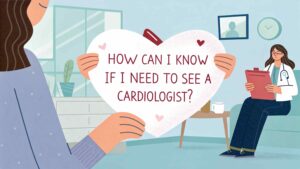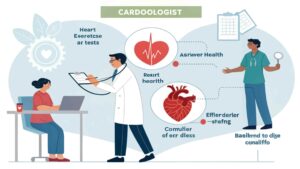Heart disease encompasses a range of conditions, including coronary artery disease and heart rhythm disorders, that affect the heart’s structure and the way it functions. Gaining a clear understanding of the symptoms and risk factors linked to this disease is a key step in supporting personal health awareness. Here’s some information about common signs and potential reasons heart disease might develop:
Recognizing Common Symptoms
Recognizing symptoms associated with heart conditions requires attention to both subtle and persistent indicators. The way these symptoms present varies widely among individuals. Some develop gradually over time, and they do not always feel severe. Recognizing and tracking these general symptoms is helpful for ongoing health monitoring.
Chest discomfort is a fundamental symptom; individuals might experience pressure, squeezing, or a sense of fullness in the center of the chest. This feeling comes and goes in some individuals. It can also remain constant. Shortness of breath is another potential indicator that appears either during activity or while resting. Other signs may include pain or pressure in various regions such as the arms, back, neck, jaw, or upper stomach. Here are some additional indications:
- Lightheadedness
- Dizziness
- Fatigue
- Swelling in the lower extremities
Evaluating Lifestyle and Behavioral Factors
The development of heart disease is linked to several lifestyle and behavioral choices, including physical inactivity and smoking. Many of these factors are modifiable, so individuals benefit from contemplating changes that support cardiovascular health. Dietary patterns are another key aspect. Consuming foods high in saturated fat, trans fat, cholesterol, and sodium can increase the risk of developing heart disease. Diets emphasizing fruits, vegetables, and whole grains offer more beneficial effects.
Regular physical activity is fundamental for heart health, while a sedentary routine increases risk. Tobacco use is widely recognized as a major contributor. Compounds in tobacco smoke may damage the heart and blood vessels. Excessive alcohol consumption is also a factor, as it has the potential to lead to high blood pressure and other health challenges over time.
Understanding Health Conditions That Elevate Risk
Beyond lifestyle habits, certain health conditions are associated with an elevated risk; managing these conditions forms part of a fundamental health strategy. High blood pressure, or hypertension, is a key factor in heart disease risk. When blood pressure remains high over time, the heart must work more intensely to circulate blood. This state has the potential to cause thickened heart muscle and contribute to arterial changes.
Elevated cholesterol levels also play a pivotal role. Certain types of cholesterol can accumulate in arteries, resulting in a buildup known as plaque. This restricts blood flow and creates challenges for heart function. Diabetes is another significant risk factor, as increased blood glucose levels may harm both blood vessels and the nerves that regulate the heart’s activities.
Schedule a Heart Disease Screening Today
Regular monitoring of your health, along with an understanding of heart disease symptoms, risk factors, and lifestyle influences, supports a proactive approach to well-being. This knowledge prepares you for productive discussions with healthcare professionals about personal risk and prevention strategies, such as managing blood pressure and cholesterol. If you notice potential warning signs or factors that may increase your risk, consult a healthcare provider today for further guidance.















